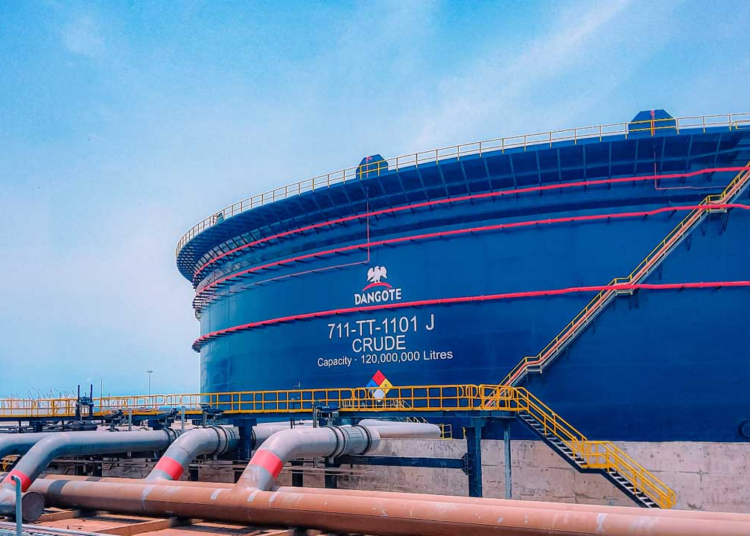The Dangote Refinery has reduced its ex-depot price of premium motor spirit (PMS) by N40, bringing the new price to N840 per litre.
Also, with assurance of a steady supply of petroleum products, more independent marketers have joined the growing list of distributors retailing Dangote Refinery’s high-quality petroleum products across the country.
This is as the new initiative of the Dangote Petroleum Refinery continues to draw accolades from energy experts in the country, with some describing it as the best that has happened to the sector since Independence.
Chief executive of Financial Derivatives Company, Bismarck Rewane, said the company’s free distribution initiative will reduce production costs, ease inflationary pressures, and stimulate economic growth
New marketers have signed the partnership deal with Dangote Refinery just as the Refinery management announced a reduction in its ex-depot price of Premium Motor Spirit (PMS), commonly known as petrol, from N880 to N840 per litre. The new pricing took effect on 30 June 2025.
Group spokesperson, Dangote Industries, Anthony Chiejina, confirmed the price adjustment in Lagos, stating, “PMS price has been reduced from N880 to N840 per litre effective 30th June.”
The previous increase to N880 per litre had followed global crude oil market volatility, particularly during the 12-day geopolitical crisis in the Middle East, which pushed crude oil prices to nearly $80 per barrel.
The refinery’s existing partners; MRS, Heyden, Ardova (AP), Hyde, Optima, and Techno Oil, are expected to reflect the new pricing at their retail outlets.
Additionally, several new marketing companies have joined Dangote’s distribution network. These include TotalEnergies, Garima Petroleum, Sunbeth Energies, Sobaz Nigeria Ltd., Virgin Forest Energy, Sixxco Oil Ltd., N.U. Synergy Ltd., and Soroman Nigeria Ltd. Others on the growing list are Jezco Oil Nigeria Ltd., Jengre, Cocean, Kifayat, Triumph Golden, Sifem Global, Riquest, and Mamu Oil, among others.
The Dangote Refinery, the largest single-train refinery in the world, continues to expand its domestic fuel distribution footprint, offering competitive pricing and improving access to refined products across Nigeria.
The refinery announced that it had invested over N720 billion to implement its initiative of deploying 4,000 Compressed Natural Gas-powered trucks for the nationwide distribution of petroleum products, saying it is expected to save Nigerians over N1.7 trillion annually.
The Refinery said, “This step, the management, will see the refinery absorb over N1.07 trillion annually in fuel distribution costs. The initiative is also poised to significantly benefit over 42 million Micro, Small and Medium Enterprises (MSMEs) by reducing energy costs and enhancing profitability.”
The initiative, which eliminates transportation costs for fuel marketers and large-scale consumers, is expected to help reduce pump prices and inflation.
The company earlier said that “from August 15, Dangote will begin the direct delivery of petrol and diesel to filling stations, industrial facilities, and other high-volume consumers.”
Meanwhile, Rewane dismissed concerns about the refinery becoming a monopoly, arguing that inefficiencies in the sector have been systemic and long-standing. He added that the scheme would help curb the parasitic role traditionally played by middlemen.
Rewane dismissed concerns about the refinery becoming a monopoly, arguing that inefficiencies in the sector have been systemic and long-standing. He added that the scheme would help curb the parasitic role traditionally played by middlemen.
“What Dangote is doing achieves two key objectives: delivering products across the entire country at a uniform price by eliminating bridging costs and significantly reducing logistics expenses through the use of CNG-powered trucks to reach every corner of the nation.
“In economic terms, middlemen—who typically do not invest—are often viewed as parasitic, extracting margins simply for distributing goods. Dangote is bypassing this layer by directly handling distribution and, notably, providing credit facilities to the retail end of the business,” he said.
Energy expert and co-founder of Dairy Hills, Kelvin Emmanuel, said Dangote’s decision to absorb logistics costs marks a turning point that could finally allow Nigerians to enjoy the benefits of local refining.
Energy analyst Ibukun Phillips described the move as “revolutionary”, suggesting it could reshape Nigeria’s energy sector by improving affordability and access, particularly in rural communities.
“Rural consumers, who typically pay more despite earning less, stand to benefit immensely. This could also revive abandoned filling stations and promote equitable distribution,” she explained.
In the same vein, the Independent Petroleum Marketers Association of Nigeria (IPMAN) also commended the development, calling it a timely resolution to longstanding challenges in the downstream sector.
IPMAN’s national publicity secretary, Chinedu Ukadike, said the new model would significantly reduce logistical burdens for independent marketers by delivering more affordable fuel directly to filling stations.
“Our pipelines have been non-functional for years, yet nothing has been done to revive the infrastructure linking the country’s 21 depots. We’ve had to rely on expensive transport from coastal depots,” Ukadike said. “Dangote’s intervention lifts a huge burden off the shoulders of independent marketers.”
The initiative by Dangote, which eliminates transportation costs for fuel marketers and large-scale consumers, is expected to help reduce pump prices and inflation. From 15 August, Dangote will begin the direct delivery of petrol and diesel to filling stations, industrial facilities, and other high-volume consumers.
According to a statement from the refinery, it aims to meet Nigeria’s daily consumption of 65 million litres of refined petroleum products. This includes 45 million litres of Premium Motor Spirit (PMS), 15 million litres of diesel, and 5 million litres of aviation fuel.
It added that the Dangote Group would invest N720 billion in acquiring 4,000 CNG-powered trucks and establishing nationwide CNG ‘mother and daughter’ stations, among other infrastructure, to implement the free distribution initiative.











